| Listing 1 - 10 of 31 | << page >> |
Sort by
|
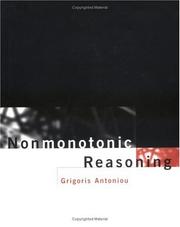
ISBN: 9780262267199 0585037035 9780585037035 0262267195 9780262011570 0262011573 Year: 1997 Publisher: Cambridge, Mass. : MIT Press,
Abstract | Keywords | Export | Availability | Bookmark
 Loading...
Loading...Choose an application
- Reference Manager
- EndNote
- RefWorks (Direct export to RefWorks)
Nonmonotonic reasoning provides formal methods that enable intelligent systems to operate adequately when faced with incomplete or changing information. In particular, it provides rigorous mechanisms for taking back conclusions that, in the presence of new information, turn out to be wrong and for deriving new, alternative conclusions instead. Nonmonotonic reasoning methods provide rigor similar to that of classical reasoning; they form a base for validation and verification and therefore increase confidence in intelligent systems that work with incomplete and changing information. Following a brief introduction to the concepts of predicate logic that are needed in the subsequent chapters, this book presents an in depth treatment of default logic. Other subjects covered include the major approaches of autoepistemic logic and circumscription, belief revision and its relationship to nonmonotonic inference, and briefly, the stable and well-founded semantics of logic programs.
Nonmonotonic reasoning. --- Non-monotonic reasoning --- Reasoning --- COMPUTER SCIENCE/Artificial Intelligence
Book
ISBN: 9783031157073 Year: 2022 Publisher: Cham Springer International Publishing :Imprint: Springer
Abstract | Keywords | Export | Availability | Bookmark
 Loading...
Loading...Choose an application
- Reference Manager
- EndNote
- RefWorks (Direct export to RefWorks)
Logic programming --- Nonmonotonic reasoning --- Non-monotonic reasoning --- Reasoning
Book
ISBN: 3031157060 3031157079 Year: 2022 Publisher: Cham, Switzerland : Springer,
Abstract | Keywords | Export | Availability | Bookmark
 Loading...
Loading...Choose an application
- Reference Manager
- EndNote
- RefWorks (Direct export to RefWorks)
Logic programming --- Nonmonotonic reasoning --- Non-monotonic reasoning --- Reasoning
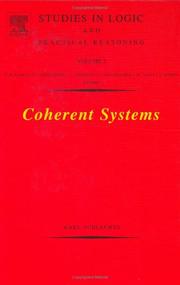
ISBN: 1281119792 9786611119799 1423709349 0080502199 0444517898 Year: 2004 Publisher: Amsterdam ; Boston : Elsevier,
Abstract | Keywords | Export | Availability | Bookmark
 Loading...
Loading...Choose an application
- Reference Manager
- EndNote
- RefWorks (Direct export to RefWorks)
One aspect of common sense reasoning is reasoning about normal cases, e.g. a physician will first try to interpret symptoms by a common disease, and will take more exotic possibilities only later into account. Such ""normality"" can be encoded, e.g. bya relation, where case A is considered more normal than case B. This gives a standard semantics or interpretation to nonmonotonic reasoning (a branch of common sense reasoning), or, more formally, to nonmonotonic logics. We consider in this book the repercussions such normality relations and similarconstructions have on the resulting nonm
Nonmonotonic reasoning. --- Algebraic logic. --- Semantics --- Modality (Logic) --- Mathematical models. --- Modal logic --- Logic --- Nonclassical mathematical logic --- Bisimulation --- Mathematical linguistics --- Logic, Symbolic and mathematical --- Non-monotonic reasoning --- Reasoning
Book
ISBN: 1283379929 9786613379924 1400843014 9781400843015 9781283379922 Year: 2007 Publisher: Princeton, N.J. : Princeton University Press,
Abstract | Keywords | Export | Availability | Bookmark
 Loading...
Loading...Choose an application
- Reference Manager
- EndNote
- RefWorks (Direct export to RefWorks)
Building theories of organizations is challenging: theories are partial and "folk" categories are fuzzy. The commonly used tools--first-order logic and its foundational set theory--are ill-suited for handling these complications. Here, three leading authorities rethink organization theory. Logics of Organization Theory sets forth and applies a new language for theory building based on a nonmonotonic logic and fuzzy set theory. In doing so, not only does it mark a major advance in organizational theory, but it also draws lessons for theory building elsewhere in the social sciences. Organizational research typically analyzes organizations in categories such as "bank," "hospital," or "university." These categories have been treated as crisp analytical constructs designed by researchers. But sociologists increasingly view categories as constructed by audiences. This book builds on cognitive psychology and anthropology to develop an audience-based theory of organizational categories. It applies this framework and the new language of theory building to organizational ecology. It reconstructs and integrates four central theory fragments, and in so doing reveals unexpected connections and new insights.
Organizational sociology --- Nonmonotonic reasoning. --- Categories (Philosophy) --- Predicaments (Categories) --- Knowledge, Theory of --- Logic --- Ontology --- Predicate (Logic) --- Non-monotonic reasoning --- Reasoning --- Organization (Sociology) --- Organization theory --- Sociology of organizations --- Sociology --- Bureaucracy --- Methodology. --- Nonmonotonic reasoning --- Methodology --- E-books
Book
ISBN: 0262366207 9780262366205 9780262045322 026204532X 0262362244 Year: 2021 Publisher: Cambridge, Massachusetts : The MIT Press,
Abstract | Keywords | Export | Availability | Bookmark
 Loading...
Loading...Choose an application
- Reference Manager
- EndNote
- RefWorks (Direct export to RefWorks)
"The first book that provides a systematic and rigorous logical theory of causality"--
Nonmonotonic reasoning. --- Causation. --- Logistics. --- Military art and science --- Causality --- Cause and effect --- Effect and cause --- Final cause --- Beginning --- God --- Metaphysics --- Philosophy --- Necessity (Philosophy) --- Teleology --- Non-monotonic reasoning --- Reasoning --- COMPUTERS / Computer Science --- COMPUTERS / Intelligence (AI) & Semantics --- COMPUTERS / Artificial Intelligence / General
Periodical
ISSN: 18726801 01650114 Year: 1978 Publisher: [Amsterdam] : Elsevier Science
Abstract | Keywords | Export | Availability | Bookmark
 Loading...
Loading...Choose an application
- Reference Manager
- EndNote
- RefWorks (Direct export to RefWorks)
Fuzzy systems --- Fuzzy sets --- Ensembles flous --- Systèmes flous --- Fuzzy sets. --- Mathematics. --- Périodiques. --- aggregation operations --- non-additive uncertainty theory --- possibility theory --- linguistic modelling --- numerical modeling fuzzy rule-based systems --- category theory --- topology --- data fusion --- interpolative reasoning --- non-monotonic reasoning --- logic programming --- constraint-di --- Systems, Fuzzy --- Sets, Fuzzy --- System analysis --- Fuzzy logic --- Fuzzy mathematics --- Set theory
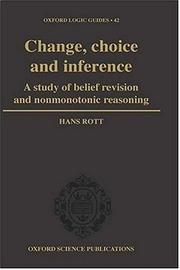
ISBN: 9780198503064 0198503067 Year: 2001 Publisher: Oxford : Clarendon ; Oxford University Press,
Abstract | Keywords | Export | Availability | Bookmark
 Loading...
Loading...Choose an application
- Reference Manager
- EndNote
- RefWorks (Direct export to RefWorks)
Choice (Psychology) --- Inference. --- Logic, Symbolic and mathematical. --- Nonmonotonic reasoning. --- Choice (Psychology). --- Inference --- Logic, Symbolic and mathematical --- Nonmonotonic reasoning --- Non-monotonic reasoning --- Algebra of logic --- Logic, Universal --- Mathematical logic --- Symbolic and mathematical logic --- Symbolic logic --- Ampliative induction --- Induction, Ampliative --- Inference (Logic) --- Reasoning --- Mathematics --- Algebra, Abstract --- Metamathematics --- Set theory --- Syllogism --- Psychology --- Logique mathématique --- Philosophie --- Artificial intelligence --- Logique --- Knowledge representation
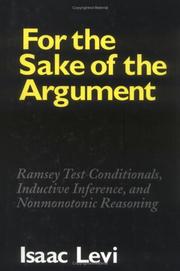
ISBN: 0521497132 9780521497138 9780511720161 9780521039017 0521039010 0511720165 Year: 1996 Publisher: Cambridge : Cambridge University Press,
Abstract | Keywords | Export | Availability | Bookmark
 Loading...
Loading...Choose an application
- Reference Manager
- EndNote
- RefWorks (Direct export to RefWorks)
This book by one of the world's foremost philosophers in the fields of epistemology and logic offers an account of suppositional reasoning relevant to practical deliberation, explanation, prediction and hypothesis testing. Suppositions made 'for the sake of argument' sometimes conflict with our beliefs, and when they do, some beliefs are rejected and others retained. Thanks to such belief contravention, adding content to a supposition can undermine conclusions reached without it. Subversion can also arise because suppositional reasoning is ampliative. These two types of nonmonotonic logic are the focus of this book. A detailed comparison of nonmonotonicity appropriate to both belief contravening and ampliative suppositional reasoning reveals important differences that have been overlooked.
Commonsense reasoning. --- Conditionals (Logic) --- Hypothesis. --- Induction (Logic) --- Inference. --- Nonmonotonic reasoning. --- Conditionals (Logic). --- Induction (Logic). --- Commonsense reasoning --- Hypothesis --- Inference --- Nonmonotonic reasoning --- Non-monotonic reasoning --- Reasoning --- Ampliative induction --- Induction, Ampliative --- Inference (Logic) --- Inductive logic --- Logic, Inductive --- Logic --- Assumption --- Supposition --- Science --- Conditional statements (Logic) --- Grammar, Comparative and general --- Common sense reasoning --- Methodology --- Induction (logique) --- Arts and Humanities --- Philosophy --- Philosophie --- Artificial intelligence --- Logique --- Knowledge representation
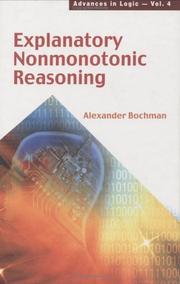
ISBN: 1281372544 9786611372545 9812567801 9789812567802 9789812561015 9812561013 Year: 2005 Volume: v. 4 Publisher: Hackensack, NJ : World Scientific,
Abstract | Keywords | Export | Availability | Bookmark
 Loading...
Loading...Choose an application
- Reference Manager
- EndNote
- RefWorks (Direct export to RefWorks)
Many approaches in the field of nonmonotonic and ""commonsense"" reasoning are actually different representations of the same basic ideas and constructions. This book gives a logical formalization of the original, explanatory approach to nonmonotonic reasoning. It uses the basic formalism of biconsequence relations, as well as derived systems of default, autoepistemic and causal inference, to cover in a single framework such diverse systems as default logic, autoepistemic and modal nonmonotonic logics, input/output and causal logics, argumentation theory, and semantics of general logic program
Nonmonotonic reasoning. --- Artificial intelligence. --- AI (Artificial intelligence) --- Artificial thinking --- Electronic brains --- Intellectronics --- Intelligence, Artificial --- Intelligent machines --- Machine intelligence --- Thinking, Artificial --- Bionics --- Cognitive science --- Digital computer simulation --- Electronic data processing --- Logic machines --- Machine theory --- Self-organizing systems --- Simulation methods --- Fifth generation computers --- Neural computers --- Non-monotonic reasoning --- Reasoning --- Nonmonotonic reasoning --- E-books
| Listing 1 - 10 of 31 | << page >> |
Sort by
|

 Search
Search Feedback
Feedback About
About Help
Help News
News